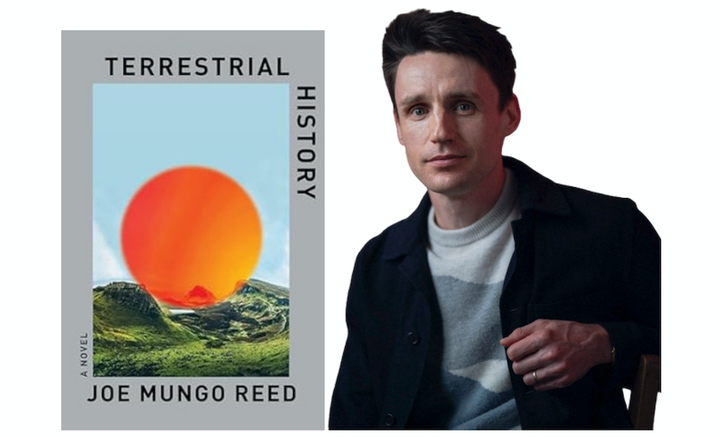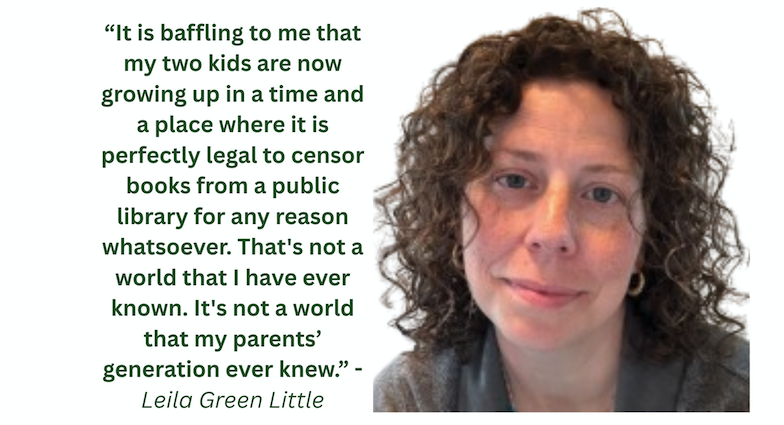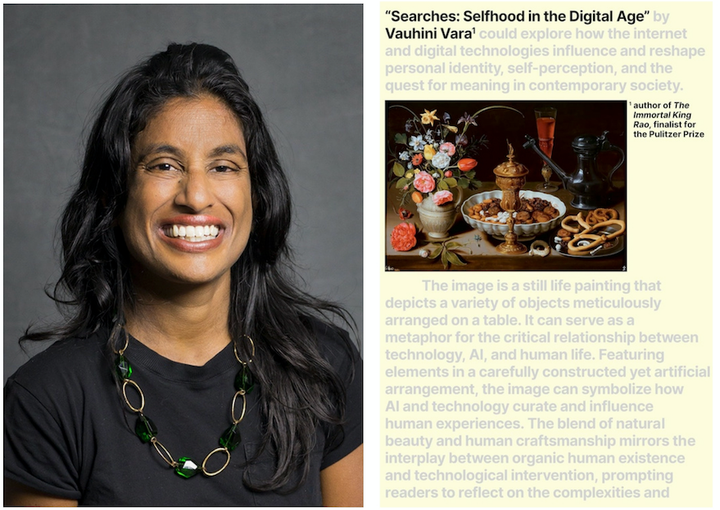In Conversation: Author and Freedom to Read Advocate Lee Wind
Ahead of Banned Books Week 2025, we caught up with the award-winning author and co-founder of We Are Stronger Than Censorship to talk about why advocates must continue to find innovative ways to fight back against the ongoing, pernicious right wing attack on the freedom to read.
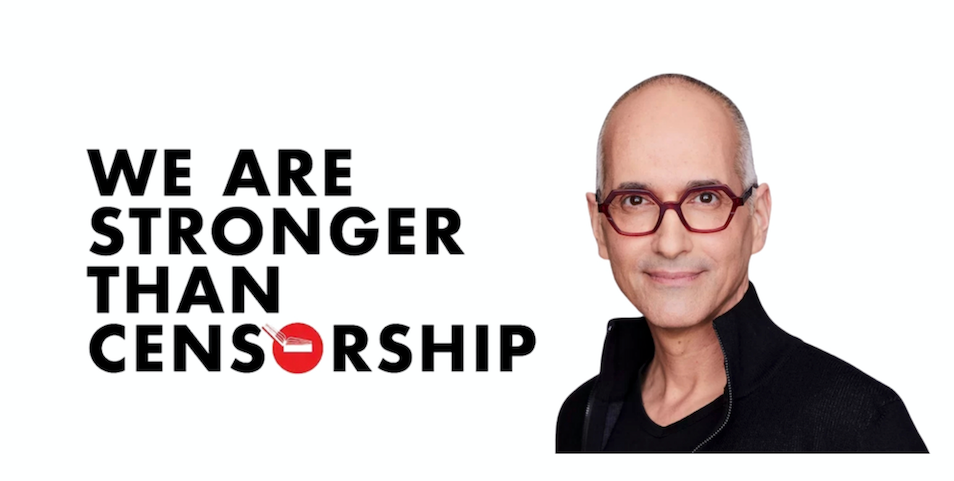
In the teeth of the ongoing, unprecedented right wing political attack on the freedom to read, Lee Wind had a realization. Authors, Publishes, and freedom to read advocates needed to do more. Alongside the important legal and legislative battles, he thought, how could advocates empower readers, better support the independent publishers and authors disproportionately impacted by this pernicious right wing assault, and work to ensure that diverse voices were not being lost in the heat of the broader battle over the freedom to read?
The result: We Are Stronger than Censorship, an effort co-founded with poet, advocate, and researcher Dr. Tasslyn Magnusson, to raise money to buy and donate two books to offset every one book challenge, distributing diverse books from participating indie publishers in communities across the nation.
In April, Wind, the author of several frequently challenged books and the Chief Content Officer of the Independent Book Publishers Association (IBPA), was awarded the Book Industry Study Group's Industry Champion Award for his role in founding We Are Stronger than Censorship. Ahead of Banned Books Week 2025, we caught up with Wind to talk about the innovative program, the threat posed by this wave of right wing book bans, and why advocates must continue to find new ways to fight back.
So, Lee, you basically brought the room to tears with your award speech about We Are Stronger than Censorship at the BISG's annual meeting in April. Which is when we knew we really wanted to highlight the work you’re doing for this year’s Banned Books Week. But why don’t we start at the top: Can you tell our readers a little about We Are Stronger than Censorship and how it got started?
Lee Wind: Sure, so, outside of my job at the Independent Book Publishers Association, I am the author of books for kids and teens, including a nonfiction series with Lerner about queer history for readers ages 11 and up. The first book is called No Way, They Were Gay?, which has gotten a lot of nice awards and been on a lot of lovely lists. The second book is called The Gender Binary Is a Big Lie. But in addition to winning some awards and landing on some good lists, the books have also landed on several banned and challenged lists. So because of that, I ended up meeting Dr. Tasslyn Magnusson.
Your readers probably know Dr. Magnusson, because she holds so much of the data on book banning in the U.S. and she does so much good work with organizations like PEN America and EveryLibrary. She’s actually a co-author of the just released PEN America report, The Normalization of Book Banning, Banned in the USA, 2024-2025.
But Tasslyn is also a beautiful person with a big heart. And she holds these meetings for authors whose books have been challenged, basically support group meetings where she gives advice and just kind of brings us together as a community. So I went to a few meetings, and we became friends. And as we started talking about these challenges to the freedom to read , it just felt like we were constantly on defense. And we both kept thinking: how do we change that? How do we go on offense?
So, we came up with the idea: What if we raised money to buy and donate two books to offset every one book challenge? And that was how we started We Are Stronger than Censorship. We've already raised enough money to offset more than 1,350 book challenges by buying and donating more than 2,700 books and we now have more than 75 partners throughout the industry. And as we continue to get the word out, we're starting to see people getting more excited about the program.
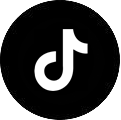
I think it's important to note that we’re not talking about donated books from publishers here—you’re raising money, and buying these books, right?
Yes, that’s right. And that is important. We really didn't want to ask publishers to give us books, because ultimately, we want a healthy publishing ecosystem. We want authors and publishers and their employees to be paid, and we want every publisher to be able to participate in this program if they want to. And while some of the big commercial publishers might be able to donate books, for indie publishers, which is the world that I'm from, that's a bigger ask.
And let’s be honest, it is often the smaller, more mission-driven independent publishers who are driving the industry’s diversity efforts. That is not to take anything away from the major corporate publishers, who are also doing a lot of beautiful, diverse books. But we've been hearing at IBPA that many indies are really feeling the effects of book bans, which are cutting into their sales to schools and libraries by huge numbers. We're hearing from some publishers about drops as much as 50% in sales to schools and libraries, which, for an indie especially, is a huge hit.
How has the program gone so far? Do you think it is starting to help bring a little bit of offense to the effort to fight book bans?
I think it is. And I think it has also helped people better understand the threat we’re facing with these book bans.
By that I mean that a lot people, even in our industry, still don't really understand that all these book bans are not really about the books, but are part of a broader political attack on people and communities these people disapprove of, most prominently the LGBTQ+ community and people of color. In fact, most of these highly organized books banning efforts are clearly designed to intimidate librarians and teachers and to make them afraid to buy and share diverse books. Just think of the ripple effect these bans could have on book acquisitions and author advances when publishers see sales of diverse titles dropping by 50% to schools and libraries.
So far, though, much of the conversation from publishers and freedom to read advocates has been about, you know, what is the number one most banned book in the country or the top 10 most banned books. And I think that is actually problematic, because it reinforces the idea that the bans are actually about specific books, when, really, the bans are part of a much broader attempt to erase entire communities from our school and library bookshelves. So that's a big part of what we’re trying to combat with We Are Stronger than Censorship.
Dr. Magnusson once told me a story about how in 2023 one person in Wisconsin challenged 444 books in a school district, and those library books were removed from Elementary, Middle School, and High Schools while they were reviewed. Four months later, nearly all the books went back on the shelves, but every kid in those schools lost access to all of those books for that whole time! So, we thought, what if for every book challenged, we could make sure that two books were purchased and donated? Maybe if people like this person in Wisconsin realized that challenging 444 books would lead to 888 books being bought and donated in their community that might slow their roll.
You note the climate of fear and intimidation among librarians and schools, and I wonder what kind of feedback you’re hearing from people who are getting books from We Are Stronger than Censorship?
Yeah, and I have a kind of poignant story to share there. There was a school in Florida that received a shipment of books, and they were so excited. But they also wanted to remain anonymous. And that made me a little sad. But I get it. We're in this crazy moment where people are afraid of being punished for being inclusive, which again, goes to the point that this book banning movement is not really about the books so much as about making certain people feel isolated and afraid.
But it also shows why books are so important and are under attack: it’s because books are empathy machines. You can read a book about someone who, on the surface, seems so different than you and yet you can see how much you share with them, how our emotions are so similar, the things we care about, our families, our friends, the things we're afraid of. Books so neatly explore commonality, much better, I think, than movies or other forms of media.
And that’s really what this is about. As someone who grew up with no books representing my gay identity, that didn't stop me from being gay. It just made me feel very isolated and alone.
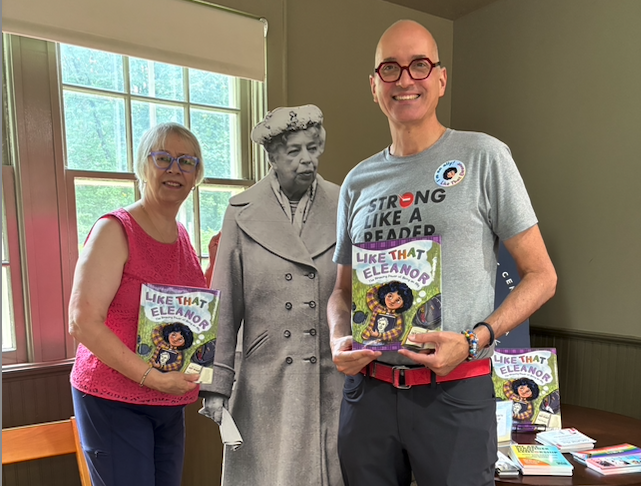
After a slow start opposing this unprecedented, politically organized right-wing attack on libraries and books when it began around 2021, it does feel like things have started to shift, and publishers and freedom to read advocates are getting on the front foot. As someone with a novel approach to fighting back, no pun intended, I wonder how you're seeing the landscape out there? Today, four years into this crisis, do you think advocates finding more ways to fight back against these book banning efforts?
Yes, for sure. But, to this day, when I tell someone that one of my books has been challenged or banned they're often like, congratulations! And I think that’s largely because, before this current wave of book banning took root, that was kind of the narrative around banned books—that the attention garnered by being a banned book actually worked to push your sales up.
And look, that is true for some authors, those top ten banned book authors, and that’s fantastic for them. But in this current wave of book bans, that kind of thinking overshadows the vast midlist of books that are today being quietly and much more widely banned, or not even bought in the first place because librarians are too scared to take a chance.
I do think publishers today now understand that this is different than previous waves of books bans, that this is a much more insidious and systemic threat. But I also see that a lot of the industry’s responses are still being driven by marketing efforts for their banned books. And while I appreciate why that happens, I also feel like we have to get past seeing book banning as a marketing opportunity and focus squarely on the fundamental danger it is.
That’s such an important point. I’ve talked with several publishers whose reps in some territories are asking for so-called ‘clean lists’ of books they can sell to schools and libraries. And I’ll note that for years Banned Books Week was often cast by some as a celebration—we used to celebrate banned books during Banned Books Week, right? Often with a letter to the editor or something. But what we see now is a very serious political battle, which requires an equally serious, often political response. Do you think that is a fair assessment?
Oh, I totally agree. And think about what a horrible, slippery slope we're now on after the Supreme Court’s decision in Mahmoud v. Taylor, where parents who don't want their child to see representations of queer families in school, for example, will now be able to opt their kids out of the lesson, as if a book about a child with two dads is somehow inherently pornographic or harmful.
But going back to your earlier question, the good news is that I do think we're all starting to get a little more organized. The lawsuits, for example, have been very important. And we do still need to write letters to the editor and it’s always important to get publicity around banned books. But what we really need is for people who believe in the freedom to read to run for their local school or library boards. We need to support candidates from the most local level of politics all the way up the chain.
And we also need to understand that there's lots of different ways to push back, and they are all important. And we all need to support each other. We don't need to jostle for position—the problem of book banning is big enough that all of us can find a place from which we can push back against it. I think We Are Stronger Than Censorship is an example of that, and I’m happy that I can be a part of something that feels hopeful.
We're now four plus years into this organized political onslaught against the freedom to read, and there's an understandable exhaustion factor among librarians on the front lines. But with the actions of the Trump administration, it feels like things are only going to get more challenging in the coming months and years. What do you say to librarians and teachers who have been bearing the brunt of this battle for so long, with so much work still to be done?
What I’d say is that being in this fight is like being in a choir. If you've ever sang in a choir, you know that you can't sustain a note forever. Sometimes, you need to take a breath. But while you're taking a breath, somebody else is carrying the note. So, if enough of us are singing together then everybody gets a chance to take a breath. We know by now that we are not in this fight alone, and in fact, we are in the majority. All the polling shows that it is a small minority pushing these attacks. So, I’d say that the key to overcoming all this hate, as exhausting and as threatening as it is, is community.
On that note, the IBPA recently became an affiliate of the American Library Association. And the move came at a very important time, as right wing politicians in several states have speciously pushed to cut ties with ALA over their defense of diversity and the freedom to read. I think it says something that the IBPA has decided to close ranks with ALA. Can you talk about that decision?
It’s funny, I think for years we didn’t even know that this was a thing, you know? Being an affiliate of ALA? But once we became aware of it, it became more of like, ‘why aren't we already doing this?’ So at IBPA we're very, very excited to now be an ALA affiliate. Obviously, librarians are absolutely on the front lines of this fight for the freedom to read. But more broadly, they are supportive of reading. So, we always want to be as supportive of libraries as we can.
Also, IBPA has always have a very big presence at the ALA annual conference. I think we occupied like 120 feet on the show floor at this year’s ALA in Philadelphia, covering two sides of the aisle. And what we’ve also found is that librarians are very supportive of indie and mission driven publishers. So, the decision to become an ALA affiliate is also about helping our member publishers.
And then, I mean, librarians are my people. Our people. I love them. We love them. They are champions for books, and especially for books like the kind I write that are really about social justice and empowering queer and allied kids and teens. So, anything that we can do to be more supportive of librarians, especially in this very threatening moment, we must do.
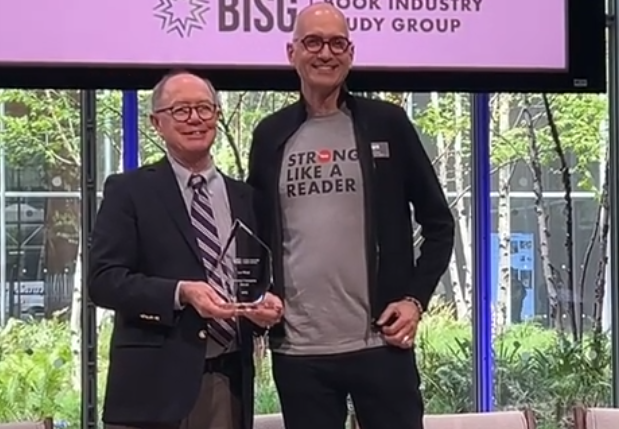
To close out, I have to ask you about the award you received in April from BISG. I think BISG is such a remarkable organization—these are the people in the publishing industry who think about all the vital, detail oriented stuff that really powers the book business, and the organization is made up of some the smartest people in the industry. What was it like to see your work and We Are Stronger than Censorship honored by BISG?
Oh, it was so cool. I was so surprised that when I got the email I literally thought it must have been sent to the wrong person!
I have to be honest, though, there's a part of me that would have been more comfortable if the award had gone to the program rather than to me personally, because that’s really how I see the award, as an honor for all of us working on We Are Stronger Than Censorship. But I was thrilled to have the opportunity to get up and talk at the BISG meeting and explain what the program is to that room full of who's who people in publishing.
And since the award, a lot of really positive things have happened. For example, reps for the Book Manufacturers Institute were at the BISG meeting and they issued a challenge to their members to help raise money to provide more banned books. Their members raised $3,852—and BMI matched that amount—helping us offset 481 book challenges with 963 books we can purchase and donate.
At the end of the day, this award is not about me. It's about this important thing that we must all do together. So, it was very affirming to know that We Are Stronger than Censorship has such wide appeal. And when I think about how the community is coming together in support of us, it really validates the thinking behind our program. We really are stronger together. And when we stand together, we really are stronger than censorship.

